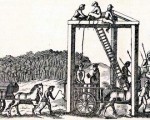
In this second part of This Week in Tudor History for week beginning 8th February, I talk about two parliamentary acts that allowed a king to execute his wife and to execute people showing signs of madness; a miscarriage of justice which led to a priest being executed in Elizabeth I’s reign; an Elizabethan astrologer who was ridiculed after his prophecies didn’t come true, and a man known as William Waste-all.
11th February 1542 – King Henry VIII gave his assent “in absentia” to an act of attainder against his fifth wife, Catherine Howard, and her lady-in-waiting, Jane Boleyn, Lady Rochford. A bill allowing people showing signs of lunacy was also passed, an awful thing, but the king was determined to take revenge.
[Read More...]
